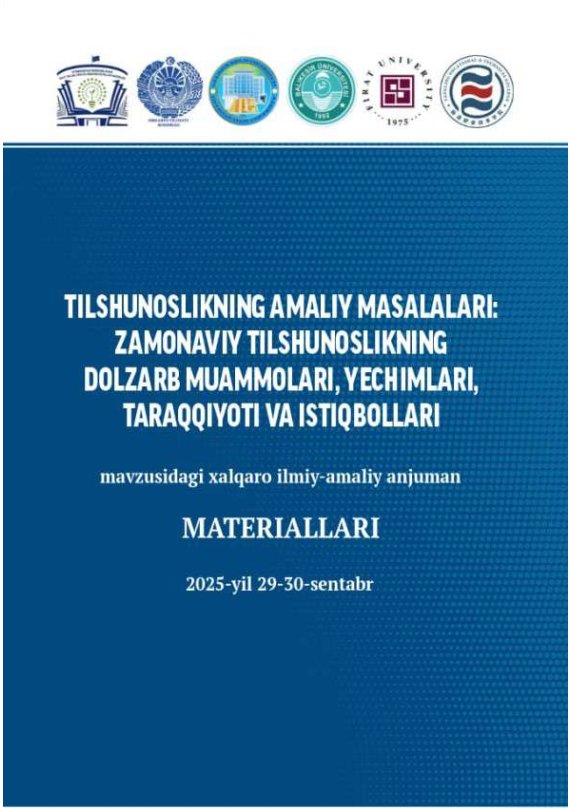POSTSTRUCTURALIST AND COGNITIVE APPROACHES TO THE TRANSFORMATION OF LANGUAGE IDENTITY
Keywords:
language identity, structuralism, poststructuralism, cognitive linguistics, psycholinguistics, death of the authorAbstract
This research investigates the development of the concept of language identity from the second half of the 20th century in the context of structuralism and poststructuralism, and its subsequent enrichment through cognitive and psycholinguistic aspects. The approaches of non-linguist thinkers like Z. Freud and J. Lacan, as well as the idea of the “death of the author,” are emphasized as central to the reevaluation of linguistic personality. The influence of the language-thought relationship and the concept of performativity on language identity is analyzed systematically.
References
1. Yermolayeva, L.S. Neohumboldtianism. – Moscow: Direct Media Publishing, Linguistic Encyclopedic Dictionary. – 2004. – pp. 305–312. URL: http://lingvisticheskiy-slovar.ru/description/neogumboldtianstvo/392
2. Yermolayeva, L.S. The Neohumboldtian School in Contemporary Bourgeois Linguistics. Problems of General and Specific Linguistics. Moscow: Publishing House of the Higher Party School and Academy of Social Sciences under the CPSU Central Committee, 1960. pp. 47–86
3. Sakharova, A.V. Linguistic Personality in the Space of Communicative Reality: In Search of a Research Paradigm: // Scientific Notes of Orel State University, Orel: OrelSU, – 2014. № 4, – pp. 95–98. URL: https://cyberleninka.ru/article/n/yazykovaya-lichnost-v-prostranstve-kommunikativnoy-realnosti-v-poiskah-paradigmy-issledovaniya
4. Weisgerber, J.L. Native Language and the Formation of Spirit. Trans. from German, intro. art. and commentary by O.A. Radchenko. 2nd ed., revised and expanded. – Moscow: Editorial URSS, – 2004. – 232 p.
Туланов, М. (2023). ФОРМИРОВАНИЕ ЭКОКУЛЬТУРНОГО И ЗДОРОВОГО ОБРАЗА ЖИЗНИ У МОЛОДЕЖИ–ТРЕБОВАНИЕ ВРЕМЕНИ. In Proceedings of International Conference on Modern Science and Scientific Studies (Vol. 2, No. 4, pp. 405-409).
Туланов, М. (2023). Построение Духовного Пространства, Просвещенного Общества, Где Человек Живет Свободно И Комфортно В Обновленном Узбекистане, Является Актуальным Вопросом. In Proceedings of International Conference on Modern Science and Scientific Studies (Vol. 2, No. 4, pp. 396-399).
Туланов, М. (2016). ИСТОРИЯ КАК ОСНОВА ДУХОВНОГО ВОСПИТАНИЯ МОЛОДЕЖИ. In Современные тенденции развития аграрного комплекса (pp. 1698-1700).
Юлчиев, Э., & Туланов, М. (2016). СОВЕРШЕНСТВОВАНИЕ СИСТЕМЫ ПОКАЗАТЕЛЕЙ ХАРАКТЕРИЗУЮЩИХ ДЕЯТЕЛЬНОСТЬ СУБЪЕКТОВ МАЛОГО БИЗНЕСА И ЧАСТНОГО ПРЕДПРИНИМАТЕЛЬСТВА. In Современные тенденции развития аграрного комплекса (pp. 1644-1645).
Туланов, М., & Юлчиев, Э. (2016). НЕОБХОДИМОСТЬ ФОРМИРОВАНИЕ СОЦИАЛЬНОГО ПАРТНЕРСТВА В АГРАРНОМ СЕКТОРЕ ЭКОНОМИКИ. In Современные тенденции развития аграрного комплекса (pp. 1413-1415).
Назаров, М., Туланов, М. К., & Акрамов, М. К. (2015). КУЛЬТУРА КАК ФАКТОР ОБЕСПЕЧЕНИЯ ИНТЕЛЛЕКТУАЛЬНЫХ И ДУХОВНЫХ ПОТРЕБНОСТЕЙ ЛИЧНОСТИ. Журнал научных публикаций аспирантов и докторантов, (6), 67-69.
Туланов, М. (2016). ДУХОВНАЯ ЦЕННОСТЬ, КАК ГЕНЕЗИС РАЗВИТИЯ НАЦИОНАЛЬНОЙ ИДЕОЛОГИИ В МНОГОНАЦИОНАЛЬНОМ ГОСУДАРСТВЕ. In Современные тенденции развития аграрного комплекса (pp. 1683-1687).


